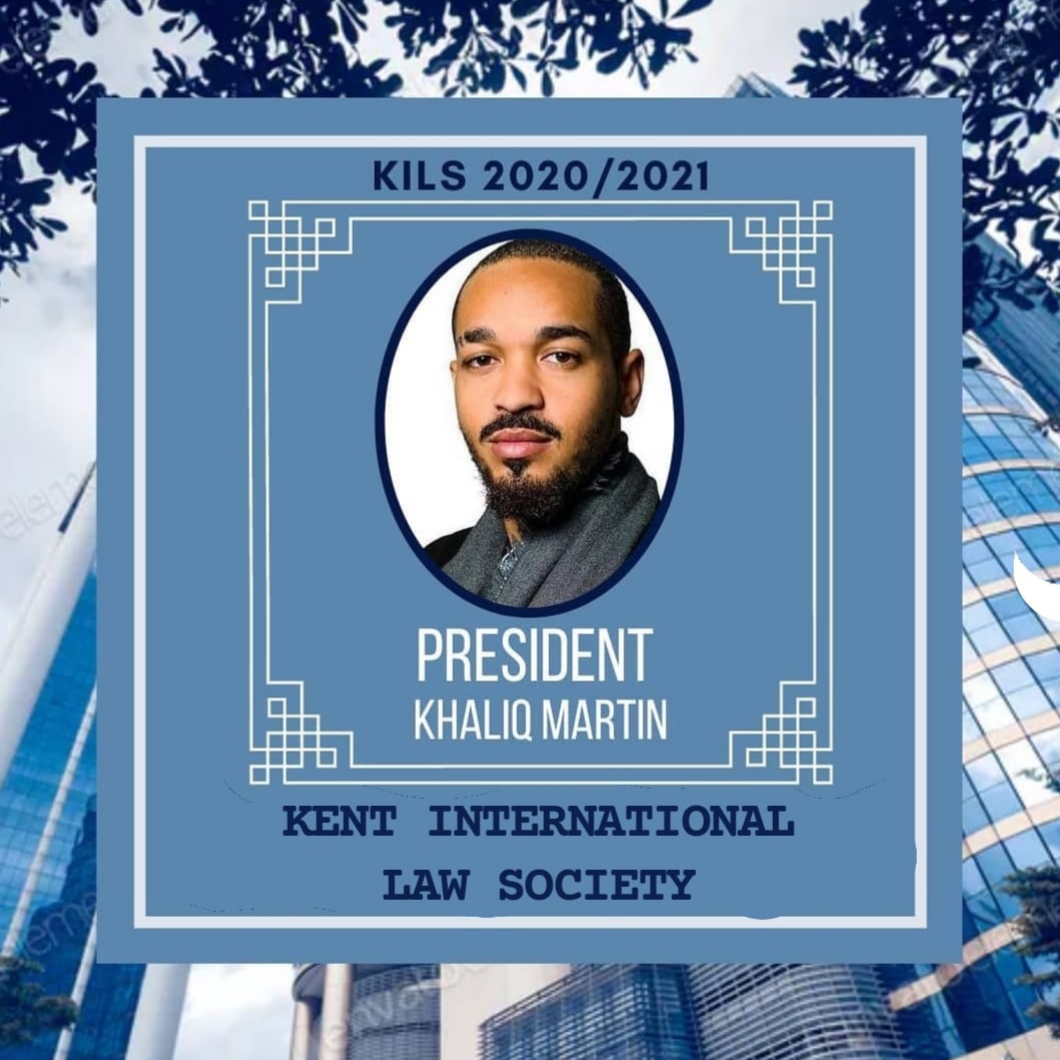Previously, the Kent International Law Society (KILS) centred International Commercial Law and Alternative Dispute Resolution such as International Commercial Arbitration. International Law has a much broader scope, thus the 2020/2021 Committee and I attempted to expand the definition of International Law this year.
The society’s efforts and outcomes
There were several different means by which we set out to lead the society in a new direction. Firstly, we established a plan to execute events and initiatives that correlated with core modules such as Criminal Law, Public Law, and Contract Law. Secondly, we held an introductory event titled “Two Takes on International Law”. The event was in conversation with the Director of the Centre of Critical International Law and Kent Law School Faculty Dr. Luis Eslava. Dr. Eslava debunked student perceptions of what the dominant idea of International Law is and provided students an introduction to the Third World Approach to International Law.
Thirdly, the committee opened two new Co-Equity Officer positions. The Co-Equity Officers ensured that our events were delivered in an equitable fashion and were inclusive to the farthest extent. A trend then emerged where other societies followed suit with the establishment of their own versions of Equity Officers under the premise of Equality, Diversity, and Inclusion. Through their efforts, our Co-Equity Officers successfully delivered a talk on International Law from the perspective of the African continent. The talk invited a panel of legal experts throughout the globe to debate interesting subjects such as the role of colonialism through International Law, as well as the International Criminal Court and whether there is a disproportionate policing of African nation-states.
Finally, we ideated and coordinated a collaboration between the Kent Critical Law Society and the Afro-Diasporic Legal Network to deliver an event on “Radical Movement Lawyering and Student Movement Organizing”. The event was attended by an all black women panel consisting of; Ife Thompson – A UK-Based Community Activist and Barrister; Temi Mwale – The Founder and Director of the 4Front Project; and Larissa Kennedy – President of the National Union of Students. The event was also successfully moderated by Kent Law School’s very own Zaleekhah Boachie, a black woman and final year senior status law student.
Benefits of being involved in the Kent International Law Society
Within my capacity, I learned of different areas of law ranging from Cyber Security to Space Law. I also had the opportunity to increase my public speaking skills by moderating, hosting, and organizing several different panels. One such panel was organized by the Kent Africa Summit which centred on “New perspectives in Traditional IFA Philosophy in International Relations and International law”. The panel consisted of Director Oluwatoyin Vincent Adepoju, Professor Ayoyemi Lawal-Arowolo Ph.D (Kent) and Dr.Gbenga Oduntan (Kent). During the discussion, participants were asked to reimagine, rethink, and restructure what the current international legal order might resemble should it be rooted in more international legal principles that reflect IFA philosophy. The result was a brief insight into a philosophy that highlighted values of unity, diversity, and an appreciation for the uniqueness of individuality; all of which the global context can surely benefit from.
Get involved in International Law
International Law is incredibly interesting, and I call upon students to delve and research into different facets of International Law that pique their curiosity. However, I repeat the same advice offered by Dr. Eslava during our introductory event. Law students and legal practitioners alike can get lost in the allure of international legal instruments and lose sight of who those instruments were intended to serve.
Contemporary discourse often frames International Law as a set of rules that pre-dated many developing and developed states which were then distributed throughout the global context. Whereas a Third World Approach to International Law will reframe such discourse so that International Law can be understood as a process that was constructed around processes of colonial administration and imperialism. Understanding its historical develop will aid students in their critical analysis of the subject, and expands their options of how to engage in the discipline
Regardless, International Law is fascinating, and the international legal order affects everyone. Thus, I encourage students to become critical thinkers in this area, in hopes of developing a more justiciable international legal order that is effective, practical, and accessible. Students can get involved with the Kent International Law Society by becoming a member of the academic society on Kent Union’s website (membership is free). You can also follow us on Instagram for updates on the KILS Instagram page.

Author: Khaliq is President of the Kent International Law Society and Co-Chair of the Afro-Diasporic Legal Network at Kent. He is a Global Officer for Kent’s GOLD programme and is a Black Interns Matter Brand Ambassador for The Stephen James Partnership.

